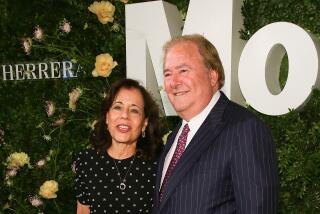E-Mails Confirm Ruse by Global
- Share via
Executives at Global Crossing Ltd. knew the company was masking its sales figures at least nine months before top officers such as Chairman Gary Winnick cashed in stock for hundreds of millions of dollars, according to company e-mails released Thursday by a congressional committee.
The e-mails decry the way the company rushed at the end of each quarter to boost revenue with “junk” deals, which involved trading capacity on fiber-optic networks with other telecommunications firms, particularly Qwest Communications International Inc.
“When saddled with unreasonable revenue expectations, we do the crazy deals at the end of the quarter,” Robin Wright, a senior vice president, wrote in an August 2000 e-mail to then-President David Walsh. The capacity swaps end up being the “plug number” needed to meet Wall Street expectations, she wrote.
Wright complained that the “crazy deals” cause prices for its services to drop, which “makes [it] more likely that we’ll need to do another deal at the end of the next quarter.”
Wright is cooperating with the congressional investigation, according to the committee.
The electronic messages mark the first time that the House Committee on Energy and Commerce has seen top officers raise such red flags about capacity swaps, said Ken Johnson, spokesman for the committee.
“These e-mails are important because they confirm our suspicion that these deals were done to inflate revenue and meet Wall Street expectations,” Johnson said.
The messages released Thursday were not addressed directly to Winnick, and it was unclear whether he ever read them.
Global Crossing said in a statement that the committee released “selected” parts of more than 60,000 pages of documents and 40,000 e-mails that the company has turned over to the committee and the Securities and Exchange Commission. The company said it would continue to cooperate with committee members and “provide them context for the materials” they are reviewing.
Wright sent her message to Walsh nine months before Winnick, Walsh and other executives and directors cashed in on the company’s highflying stock. Winnick sold $123.5 million worth of stock, and Walsh grossed $8.7 million in May 2001 sales. Overall, Winnick has cleared more than $575 million on his stock sales.
Global Crossing became the biggest telecom firm to seek bankruptcy protection when it filed a Chapter 11 petition in January to reorganize. Since then, the much-larger WorldCom Inc. has sought bankruptcy protection.
As the industry began crashing from too much capacity and slow demand, telecom firms came under fire for swapping capacity and booking it as revenue, without classifying the purchases as ordinary expenses. Such swaps also need to be based on good business rationale to pass muster as a sale.
But the e-mails suggest that Global Crossing was completing swaps and then looking for good reasons to make such deals.
A Global Crossing employee complained in a March 2001 e-mail to S. Wallace Dawson, an executive vice president, that he could not come up with a good business reason for a $60-million deal with Qwest, a deal that was originally worth $15 million.
Michael Coghill said he “in good conscience cannot pretend to develop a business case that justifies this transaction.”
In a September 2001 message, Joey Wong, a mid-level employee in finance, raised objections to the way the company strained to make a case for some of the swaps.
“I wish this company [would] just come clean with the Street regarding our guidance,” Wong wrote. “This swap crap is going to kill us in the long run and I’m personally very fed up with this business case garbage.”
In a series of e-mails between Wright and Qwest managers, Wright said, “You both know the issue, we are taking capacity in order to help with revenue recognition issues.”
More to Read
Inside the business of entertainment
The Wide Shot brings you news, analysis and insights on everything from streaming wars to production — and what it all means for the future.
You may occasionally receive promotional content from the Los Angeles Times.










